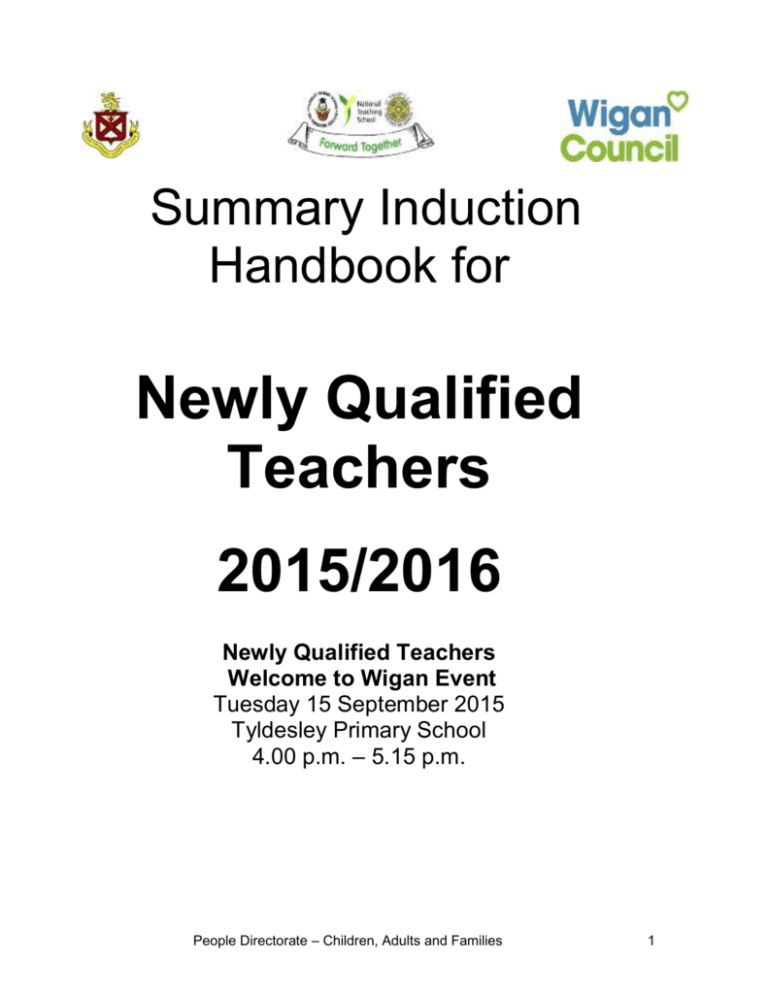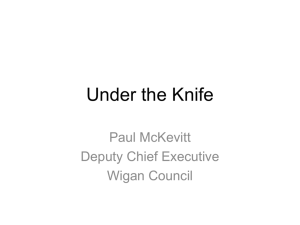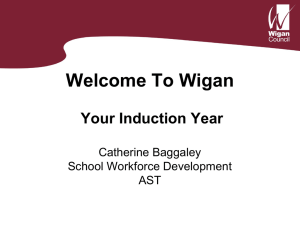Summary Induction Handbook for Newly Qualified Teachers (NQTs)
advertisement

Summary Induction Handbook for Newly Qualified Teachers 2015/2016 Newly Qualified Teachers Welcome to Wigan Event Tuesday 15 September 2015 Tyldesley Primary School 4.00 p.m. – 5.15 p.m. People Directorate – Children, Adults and Families 1 Aim and objectives of the event The aim of this event is to supply newly appointed Newly Qualified Teachers (NQTs) with information about the support they can access from the Local Authority as well as providing them with an opportunity to network with other NQTs and make contact with representatives of professional associations. By the end of the session, NQTS will have An understanding of the support available to them from the Local Authority; Vicky Bamber and Eilis Gibbons will be available to discuss elements of the NQT Process. Gained an insight into the role and responsibilities of the Cabinet Portfolio holder for Children and Young People A grasp of the functions carried out by the People Directorate for Children, Adults and Families Listened to what they can expect to experience during their NQT year Meet professional association representatives Networked with other NQTs Timetable Yvonne Brown Headteahcer Debra Lingard Associate Headteacher Councillor Joanne Platt Portfolio Holder for Children and Young People’s Services Introductions and Domestics Welcome to Wigan Introduction to People Directorate Klare Rufo for Children, Adults and Families Service Manager 0 – 19 Standards Experiences of a Newly Qualified Teacher Matthew Lewis Sarah Bamber Primary Secondary Your induction year Debra Lingard Phil Paul Associate Headteacher Assistant Headteacher Closing remarks Yvonne Brown Headteacher People Directorate – Children, Adults and Families 2 Contents Page 1. Welcome to Wigan 4 2. An Introduction to Wigan Council 5 3. People Directorate – Children, Adults and Families 7 4. Your Induction Year in Wigan 9 5. The Teachers’ Standards 13 6. Professional Association Representatives 16 7. Useful Telephone Numbers 17 People Directorate – Children, Adults and Families 3 1. Welcome to Wigan To deliver our vision of learning for the 21st Century, Wigan needs to attract and retain the best teachers and support you in your continuing professional development (CPD) and so it is our pleasure to welcome you to Wigan Council’s People Directorate – Children, Adults and Families. The Council is very proud of the work carried out in all our schools and of the high achievement of pupils. Whilst our results compare very favourably with national and local averages, we are conscious of the need to achieve even higher levels of success. Such success is not and should not be confined purely to academic results, and to this end the Council has endeavoured to ensure that all pupils have access to the widest possible range of experiences. The People Directorate is committed to safeguarding and improving the health and well being of all children in the authority and this is reflected in our Children and Young People’s Plan which will be available to read on the Council website. OFSTED has rated the Council’s children’s services as ‘performing well’. In the latest annual assessment of Children’s Services, 92% of schools in Wigan have been judged as good or outstanding. The provision of such high quality services is reliant on dedicated and committed teachers and support staff. You and your colleagues are therefore highly valued by the Council. I hope and trust that you will find Wigan Peoples Services to be a warm and welcoming community of which you feel happy to be part. I would therefore take this opportunity to wish you every success in your well chosen career and trust that you will find teaching in the Borough a rewarding and satisfying experience. James Winterbottom, Interim Director for Children and Families Councillor Joanne Platt, Cabinet Member for Children and Young People People Directorate – Children, Adults and Families 4 2. An Introduction to Wigan Council With a population of around three hundred thousand across an area of seventy-seven square miles, Wigan is one of the largest metropolitan district Councils in England. Wigan Council is a ‘unitary authority’. This means it is responsible for all the local government services in the Borough unlike those areas where there are separate county and district Councils. The Council delivers services via three directorates: People Directorate – Adults, Children and Families The People Directorate responsibilities include areas such as adult social care; children’s social care; education services and information, advice, learning and skills. Places Directorate The Places Directorate responsibilities include planning; regeneration and development; environmental health; highways; waste collection and recycling. Resources Directorate The Resources Directorate responsibilities include finance, IT, HR, Organisational Development; customer service; legal services; policy and programmes. Wigan Council employs over ten thousand full and part-time staff (including teachers and schools staff) making the organisation the Borough’s largest single employer. Wigan is a town with important and close neighbours of Manchester, Liverpool, Preston and Warrington and a history going back to the Celtic period. The area was conquered by the Romans in the 1st century and a settlement which was probably Wigan was mentioned in the 2nd century. However, the place came to prominence during the industrial revolution when it became a centre for coal production, engineering and textiles. At its peak there were one thousand pit shafts within five miles of the town and it was so extensive that a Councillor commented that ‘a coal mine in the backyard was not uncommon’. The town was one of the first to be served by a railway and this history has shaped the perception of Wigan. This characterisation was enshrined in George Orwell’s book ‘The Road to Wigan Pier’ which dealt with the living conditions of England’s working poor although ‘he liked Wigan very much’. As the principal industries of coal and cotton declined, new industries developed in the fields of engineering, printing, textiles and food processing. Attracting new investment is one of the Council’s top priorities. People Directorate – Children, Adults and Families 5 The Borough’s environment has been transformed by schemes ranging from small landscaping projects to major derelict land reclamation. There has been considerable investment in the area and more is planned. The town has readily available land for business and housing, improved transport links are on the horizon, the Wigan Life centre for health and well being is now open, there is considerable investment in education and young people, and road infrastructure, along with public transport, is being improved. The Borough is well supplied with shopping facilities and traditional markets. The town centres of Wigan and Leigh have been remodelled with multi-million pound shopping developments carefully designed so as not to destroy the warmth and tradition of the area. There are opportunities to take part in a variety of leisure activities within the Borough. The Council has developed modern sports complexes, one such being the Robin Park Area and Indoor Sports Centre. Community leisure facilities at Robin Park including the state of the art DW Stadium, home to Wigan Rugby League and Wigan Athletic and an eleven screen multiplex cinema. In Leigh, the exciting Leigh Sports Village provides some of the finest facilities within the region, catering for all ages and abilities. Wigan boasts success in many areas of sporting life including athletics, swimming, rugby union and association football. Many people are aware of the awesome reputations created by Wigan’s record breaking rugby league team, and football team. The Three Sisters complex at Ashton, with its water sports and karting areas and the Country Park at Haigh Hall with its extensive woodlands and golf course are also popular attractions. Pennington Flash in Leigh is a venue which attracts a great number of sailing enthusiasts and bird watchers. Wigan has an excellent reputation for education. Over the last five years results in examinations at the end of Key Stage 2 and Key Stage 4 have improved at a faster rate than nationally. The Council continues to have good relationships with its schools and partnership working is strong. The 2012 OfSTED inspection of Safeguarding and looked after children judged the work of the Council as good. The strong support, leadership and direction from key elected members was mentioned as being particularly beneficial. The Borough is twinned with the French City of Angers, in the Loire Valley. As well as regular official exchange visits between political leaders and officials, there are numerous groups and individuals who have made contacts on both sides including primary, secondary and special school links. These are facilitated by the annual exchange of “Ambassadors.” People Directorate – Children, Adults and Families 6 3. People Directorate - Adults, Children and Families The People Directorate – Adults, Children and Families, was formed in April 2011 and brings together the bulk of the previous Adults and CYPS (Children and Young People’s Services) departments, with the addition of Building Stronger Communities, Area Management and Metrofresh catering and caretaker services. The title of the Directorate encapsulates the main focus of its core business, that is to serve Wigan's people be they adults, children or live in families. It's an ambitious aim but one that is impor tant if the Council is to realise its goal of Connecting People to Communities. The chart overleaf explains how the People Directorate is organised and the services provided within it. Education Services Education Services sits within the People Directorate and provides a service to 102 Primary Schools (including 11 academies) 18 Secondary Schools (including 5 academies) 6 Special Schools 2 Nurseries The above establishments employ circa six thousand teachers and support staff to educate and develop more than 50,000 pupils. The schools in Wigan work collaboratively in one of eight school consortia: there are four secondary school consortia and five primary school consortia. The work of these consortia are overseen by two School Improvement Boards, one for primary and one for secondary. Schools within these consortia work collectively to improve standards in teaching, learning and leadership and management. People Directorate – Children, Adults and Families 7 People Directorate Structure (Children and Families) James Winterbottom Interim Director Children and Families Vacant J.Winterbottom@wigan.gov.uk Jayne Ivory 01942 486000 Assistant Director Assistant Director Specialist Services Education Cath Pealing Lynn Fields Service Manager Education Support, Organisation and Capital Development Mike Chew Service Manager Children’s Commissioning Jeff Cunliffe Service Manager Locality 1 Wigan North Service Manager Social Care and Safeguarding, Child in need of help and protection Klare Rufo Service Manager 0-19 Standards Elaine Dann Service Manager Locality 2 Wigan South Imi Kala Boroughwide Service Manager Elaine Baulcombe Service Manager Strategic SEN and Disability Lead Jayne Challiner Early Years, Learning and Childcare Sheila Martland Service Manager Locality 3 Hindley/Ashton Public Health Service Manager - Start Well Service Manager Corporate Parenting Wwish and Fostering Service Lynne Bennett Service Manager Corporate Parenting Children in Care and Care Leavers Sara Patel Clare Burnham / Shirley Leatherbarrow Service Manager Service Manager Child in need of Help and Protection Locality 4/5 Amy Witherup Debbie Needham Leigh/ Lowton/ Golborne / Atherton/ Tyldesley People Directorate – Children, Adults and Families Chris Mumford Service Manager Safeguarding 8 4. Your Induction Year in Wigan The first year of teaching is a very important one. Recently, NQTs have remarked how different the experience is from teaching practice. Having complete responsibility for groups of children for a full year can be both challenging and exciting, but also very tiring and for some, a little difficult from time to time. To help you through your first year of teaching, you are entitled to an induction programme of well-organised support. As well as helping you succeed in your first year of teaching, it should give you the foundations for longer-term professional and career development. At interview you should: Have provided the school with original documents confirming your qualifications and your successful completion of the skills tests Between appointment and taking up the post you should: Receive documentation, manageable in quantity, which will help you to become familiar with the school’s systems and expectations; these could include: o o o o o o o o o o o o o o o o o o o o o o o o The aims of the school School prospectus Staff handbook School policy documents Subject policies, handbooks and schemes of work Planning guidelines and formats Assessment and marking requirements including reporting arrangements. Arrangements for photocopying Procedures for stock distribution/resources Holiday dates Fire drill procedures School uniform policy How to complete the attendance and any other register School calendar and meetings schedule Lunchtime arrangements Wet break/lunchtime arrangements Procedures for informing school of illness/absence Behaviour management policies and procedures Child protection and safeguarding arrangements Health and Safety information including accident or emergency procedures Homework policy Contacting parents Meeting schedule CPD opportunities People Directorate – Children, Adults and Families 9 Receive proof of your enhanced DBS check Have the chance to visit the school and meet key staff with whom you will be working, including your induction tutor Receive sufficient information about the class or classes you will be teaching to be able to begin planning Have an introductory meeting with your induction tutor Receive relevant or confidential information about any children you will teach including those with special educational needs Please note If you do not receive the relevant information from the school before you take up your position you should request it on your first day or during your first week. Your induction programme should offer you: An individual programme of monitoring and support, but adapted to your needs as the year progresses The opportunity to contribute to your personalised programme of support A timetable equivalent to 90% of the normal teaching time undertaken by other teachers in the school for professional development activities In addition to the above, 10% Planning, Preparation and Assessment (PPA) noncontact time Support from a designated induction tutor. In a small school this could be your Headteacher, in another school a senior member of staff. In larger schools it could be your team leaders or a suitably experienced teacher who has considerable professional contact with you Focused observation of your teaching and follow-up discussion. Your first observation should be within your first four weeks in school. You should expect to be observed at least once in any 6 – 8 week period, at least once in every half term (in a three-term year). You should have the opportunity for a follow-up discussion and should receive a brief written record of each observation. As this is subject to your specific needs it maybe that more observations and follow up discussions are arranged to meet your specific needs for example if there are concerns surrounding your progress towards the standards. People Directorate – Children, Adults and Families 10 At least one professional review meeting with your induction tutor every half term in any 6 – 8 week period(in a three year-term year) to discuss progress; set new targets and identify any support you may need to achieve them Three formal assessment meetings of your performance against the Teachers’ Standards The opportunity to observe experienced teachers in your own school, and if possible in another school, where particular areas of good practice have been identified A planned programme of CPD, to be organised by the school and to take place within your 10% timetabled allocation. The programme of CPD should be based on your strengths and areas for development, identified in your self-review against the Teachers’ Standards. Part of your programme of CPD may also involve attending training sessions and courses organised by Wigan Council or other providers Opportunities to work with the school SENCO or another teacher with significant expertise in teaching SEN pupils Support for parents’ meetings A named contact in the Local Authority (LA), with whom you can get in touch at any time to discuss any difficulties with your induction that you have not been able to resolve in school. Your contact is Vicky Bamber NQT Induction Co-ordinator Wigan Council, Town Hall, Library Street, Wigan, POBOX 100, WN1 3DS 01942 828947 v.bamber@wigan.gov.uk The LA is the appropriate body for the NQTs and continues to carry out the administration for NQTs. The LA has commissioned schools within the Borough to undertake work with NQTs and their Mentors. Their role is: To liaise with relevant LA Staff who will continue to deal with the administrative elements of NQT Requirements (LA being a Strategic Partner). To support school mentors and NQTs where issues have been identified and notified by the LA (where appropriate, create action plans with the school to address the issues). People Directorate – Children, Adults and Families 11 To provide opportunities to work with SENCO and a range of subject leaders. To monitor 10% of Secondary and 10% of Primary Schools. To facilitate and deliver termly mentor meetings. In addition to this work they offer a range of CPD Sessions, a Primary and Secondary Conference and support in monitoring NQT entitlement to induction. By the end of the induction year you should have a professional portfolio that includes: A completed self-review against the Teachers’ Standards. A series of action plans and evidence demonstrating the progress made during the induction year referencing the Teachers’ Standards Evidence of the CPD activities you have undertaken during the year towards meeting the Teachers’ Standards; this evidence can be from lesson observations, meetings with induction tutor, day to day planning or marking, pupil progress and evidence of attendance at training / inset days There will be three completed termly assessments evidenced and signed to show progress through the year. The final assessment will detail targets that will feed into the schools performance management cycle in the second year of teaching. You are entitled to receive support and guidance from: Your named school induction tutor who will provide you with a structured programme and guidance about school procedures Senior Management Team, Subject Leader/Curriculum Coordinator/Head of Department, Key Stage Leader, CPD Leader, other staff members Professional Associations; it is advisable to join a Teaching Union/Professional Association. There are school representatives in addition to the Wigan officers whose details are included in this booklet In school this entitlement is ultimately overseen by the Headteacher. People Directorate – Children, Adults and Families 12 The Teachers’ Standards 5. www.wigan.gov.uk In order to successfully complete the induction period, a newly qualified teacher must demonstrate evidence against the Teachers’ Standards listed below. As well as providing an induction framework, these standards should also provide NQTs with a focus for professional development. Teachers’ Standards Introduction - Preamble Teachers make the education of their pupils their first concern, and are accountable for achieving the highest possible standards in work and conduct. Teachers act with honesty and integrity; have strong subject knowledge, keep their knowledge and skills as teachers up-to-date and are self-critical; forge positive professional relationships; and work with parents in the best interests of their pupils. Part One : Teaching A teacher must: 1 Set high expectations which inspire, motivate and challenge pupils establish a safe and stimulating environment for pupils, rooted in mutual respect set goals that stretch and challenge pupils of all backgrounds, abilities and dispositions demonstrate consistently the positive attitudes, values and behaviour which are expected of pupils 2 Promote good progress and outcomes by pupils be accountable for pupils’ attainment, progress and outcomes be aware of pupils’ capabilities and their prior knowledge, and plan teaching to build on these guide pupils to reflect on the progress they have made and their emerging needs demonstrate knowledge and understanding of how pupils learn and how this impacts on teaching encourage pupils to take a responsible and conscientious attitude to their own work and study People Directorate – Children, Adults and Families 13 3 Demonstrate good subject and curriculum knowledge have a secure knowledge of the relevant subject(s) and curriculum areas, foster and maintain pupils’ interest in the subject, and address misunderstandings demonstrate a critical understanding of developments in the subject and curriculum areas, and promote the value of scholarship demonstrate an understanding of and take responsibility for promoting high standards of literacy, articulacy and the correct use of standard English, whatever the teacher’s specialist subject if teaching early reading, demonstrate a clear understanding of systematic synthetic phonics if teaching early mathematics, demonstrate a clear understanding of appropriate teaching strategies 4 Plan and teach well structured lessons impart knowledge and develop understanding through effective use of lesson time promote a love of learning and children’s intellectual curiosity set homework and plan other out-of-class activities to consolidate and extend the knowledge and understanding pupils have acquired reflect systematically on the effectiveness of lessons and approaches to teaching contribute to the design and provision of an engaging curriculum within the relevant subject area(s) 5 Adapt teaching to respond to the strengths and needs of all pupils know when and how to differentiate appropriately, using approaches which enable pupils to be taught effectively have a secure understanding of how a range of factors can inhibit pupils’ ability to learn, and how best to overcome these demonstrate an awareness of the physical, social and intellectual development of children and know how to adapt teaching to support pupils’ education at different stages of development have a clear understanding of the needs of all pupils, including those with special educational needs; those of high ability; those with English as an additional language; those with disabilities; and be able to use and evaluate distinctive teaching approaches to engage and support them 6 Make accurate and productive use of assessment know and understand how to assess the relevant subject and curriculum areas, including statutory assessment requirements make use of formative and summative assessment to secure pupils’ progress use relevant data to monitor progress, set targets, and plan subsequent lessons People Directorate – Children, Adults and Families 14 give pupils regular feedback, both orally and through accurate marking, and encourage pupils to respond to the feedback 7 Manage behaviour effectively to ensure a good and safe learning environment have clear rules and routines for behaviour in classrooms, and take responsibility for promoting good and courteous behaviour both in classrooms and around the school, in accordance with the school’s behaviour policy have high expectations of behaviour, and establish a framework for discipline with a range of strategies, using praise, sanctions and rewards consistently and fairly manage classes effectively, using approaches which are appropriate to pupils’ needs in order to involve and motivate them maintain good relationships with pupils, exercise appropriate authority, and act decisively when necessary 8 Fulfil wider professional responsibilities make a positive contribution to the wider life and ethos of the school develop effective professional relationships with colleagues, knowing how and when to draw on advice and specialist support deploy support staff effectively take responsibility for improving teaching through appropriate professional development, responding to advice and feedback from colleagues communicate effectively with parents with regard to pupils’ achievements and well-being. Part Two: Personal and Professional Conduct A teacher is expected to demonstrate consistently high standards of personal and professional conduct. The following statements define the behaviour and attitudes which set the required standard for conduct throughout a teacher’s career. Teachers uphold public trust in the profession and maintain high standards of ethics and behaviour, within and outside school, by: treating pupils with dignity, building relationships rooted in mutual respect, and at all times observing proper boundaries appropriate to a teacher’s professional position having regard for the need to safeguard pupils’ well-being, in accordance with statutory provisions showing tolerance of and respect for the rights of others People Directorate – Children, Adults and Families 15 not undermining fundamental British values, including democracy, the rule of law, individual liberty and mutual respect, and tolerance of those with different faiths and beliefs ensuring that personal beliefs are not expressed in ways which exploit pupils’ vulnerability or might lead them to break the law. Teachers must have proper and professional regard for the ethos, policies and practices of the school in which they teach, and maintain high standards in their own attendance and punctuality. Teachers must have an understanding of, and always act within, the statutory frameworks which set out their professional duties and responsibilities. 6. Professional Association Representatives Teacher Trade Union Local Contact Details Trade Union Branch Local Representative National Association of Schoolmasters Union of Women Teachers Steve Wilson F/T Branch Secretary / Convenor Steve.Wilson@mail.nasuwt.org.uk (NASUWT) Contact Address/Tel No. Wigan NASUWT NASUWT-NWRC Skull House Lane Appley Bridge Wigan WN6 9DL Tel: 01257 253716 National Union of Teachers Max Atkins F/T Divisional Secretary (NUT) secretary@wigan.nut.org.uk C/O St Peter's Primary School Leigh Street Leigh WN7 4TP www.WiganNUT.co.uk 07758 227440 Association of Teachers and Lecturers Angela Wells F/T Branch Secretary (ATL) awells@wigan.atl.org.uk Address for Union Business: 38 Bramcote Avenue St Helens Merseyside WA11 9JQ 01744 600199 People Directorate – Children, Adults and Families 16 National Association of Head Teachers Mike Wilson P/T Branch Secretary (NAHT) wigan@nahtofficals.org.uk 52 Widdrington Road Wigan WN1 2LU 07789920120 Associational of School and College Leaders Helen Phillips P/T Branch Secretary (ASCL) h.phillips@bedford.wigan.sch.uk Bedford High School Manchester Road Leigh WN7 2LU 01942 486386 7. Useful Telephone Numbers and Web Links HR Employment Services Centre 01942 827333 Vicky Bamber, NQT Co-ordinator 01942 828947 Eilis Gibbons, NQT Administrator 01942 404031 Debra Lingard Primary School Contact 01942 882870 Phil Paul Secondary School Contact 01942 728221 Klare Rufo Service Manager 0-19 Standards 01942 486258 Nicola Birchall Education Support and School Improvement Service Coordinator 01942 486247 Other useful names and contact numbers can be found on the Wigan Intranet’s Telephone Directory http://wm10/phonebook/index.asp You have your own dedicated website at https://www.wigan.gov.uk/Business/Professionals/Newly-Qualified-Teachers/Newlyqualified-teachers.aspx The following link will take you to other useful websites https://www.tda.uk/ People Directorate – Children, Adults and Families 17







